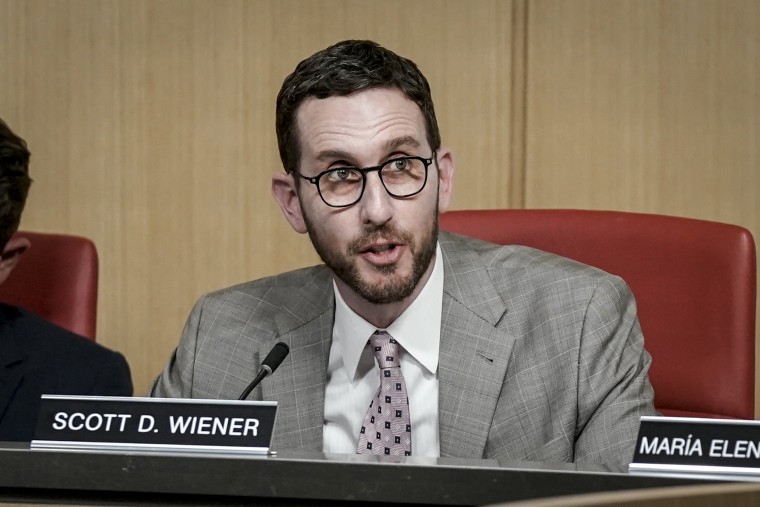Former House Speaker Nancy Pelosi's statement that she will not seek re-election ended a decade in Congress and in the highest echelons of the Democratic Party.
Now her departure also paints a clearer picture of the race to become San Francisco's next representative in the House — and how Democrats want to chart the future of their party at a moment of generational change.
Two top contenders for the seat in Pelosi's district—Scott Wiener, a California state senator, and Saikat Chakrabarti, former chief of staff to Rep. Alexandria Ocasio-Cortez—have already entered the race ahead of Pelosi's decision.
Others could enter the California race ahead of the statewide primary next June, but the views of the two existing candidates already reflect different wings of the Democratic Party.
In an interview with NBC News, Wiener said he has experience building diverse coalitions and implementing legislation, while Chakrabarti touted his commitment to “whole-scale structural change.” The outlook reflects a broader party debate about whether political change should be achieved more through practical achievements within existing systems or, rather, through a complete overhaul of those long-standing systems.
This is not the first time that the race to replace a former speaker has also served as a litmus test for the party's future. After then-House Speaker John Boehner resigned in 2015, the crowded GOP primary to fill his seat in Ohio echoed broader GOP debates about its future. Rep. Warren Davidson ultimately won the seat with the support of the conservative, anti-establishment Club for Growth. sparred before with Boehner.
Neither Wiener nor Chakrabarti believed Pelosi's announcement made much difference in the dynamics of the race. Wiener predicted that Chakrabarti, who has focused most of his attention on Pelosi, will instead move on to attacking the state senator. Chakrabarti said he believes it's not just about the former speaker, but that the Democratic Party needs a “total change.”
“In my opinion, the real moment right now in the Democratic Party is, do we want to go back to business as usual?” Chakrabarti said in an interview, calling his opponent “part of normal establishment politics.”
Despite the controversy, Wiener presented himself as a candidate who could actually succeed.
“It’s not enough to just say you want to achieve X, Y and Z and make a video about it, you need to give voters confidence that you know how to actually deliver on those promises on housing, health care, energy and so on,” Wiener said, referring to Chakrabarti’s social media presence.

Wiener's website touts the candidate's record of having “authored and passed more than 100 state laws,” indicating his commitment to advancing housing and LGBTQ issues.
Chakrabarti disputed Wiener's questions about whether he could act legislatively. He emphasized his role in creating Green New Deala progressive set of policy goals, and argued that as people mobilized around climate, it forced Democratic presidential candidates to embrace environmental proposals in 2019 and 2020. Chakrabarti argued that this push contributed to the passage of former President Joe Biden's Inflation Reduction Act, which included billions of dollars to combat climate change.
Pelosi has not yet spoken out about the race, and she told NBC News last week that endorsing the nominee was not part of her “current plan.”
Chakrabarti declined to say whether he was in talks about potential support with people like Ocasio-Cortez or Sen. Bernie Sanders, I-Vt. Chakrabarti worked on Sanders' 2016 presidential campaign.
Chakrabarti acknowledged that if he were elected in 2026, while Republicans still control the White House, he would be unable to move forward with goals such as introducing universal health care or developing a national bank to “finance, finance and develop affordable housing.” Instead, he said his initial goals would be to “protect” voters from Trump administration policies such as immigration raids and troop deployments, and to work to “force a conversation” on anti-corruption issues.
If elected, Wiener emphasized that he wants to elevate housing as a larger issue at the federal level. Asked about similarities and differences with Pelosi, he noted that he “very much agrees” with her on issues such as expanding access to health care and said he is a “huge fan of her work.”
“I’m my own person and we have a lot of the same values and priorities, and I have my own priorities,” he said.







